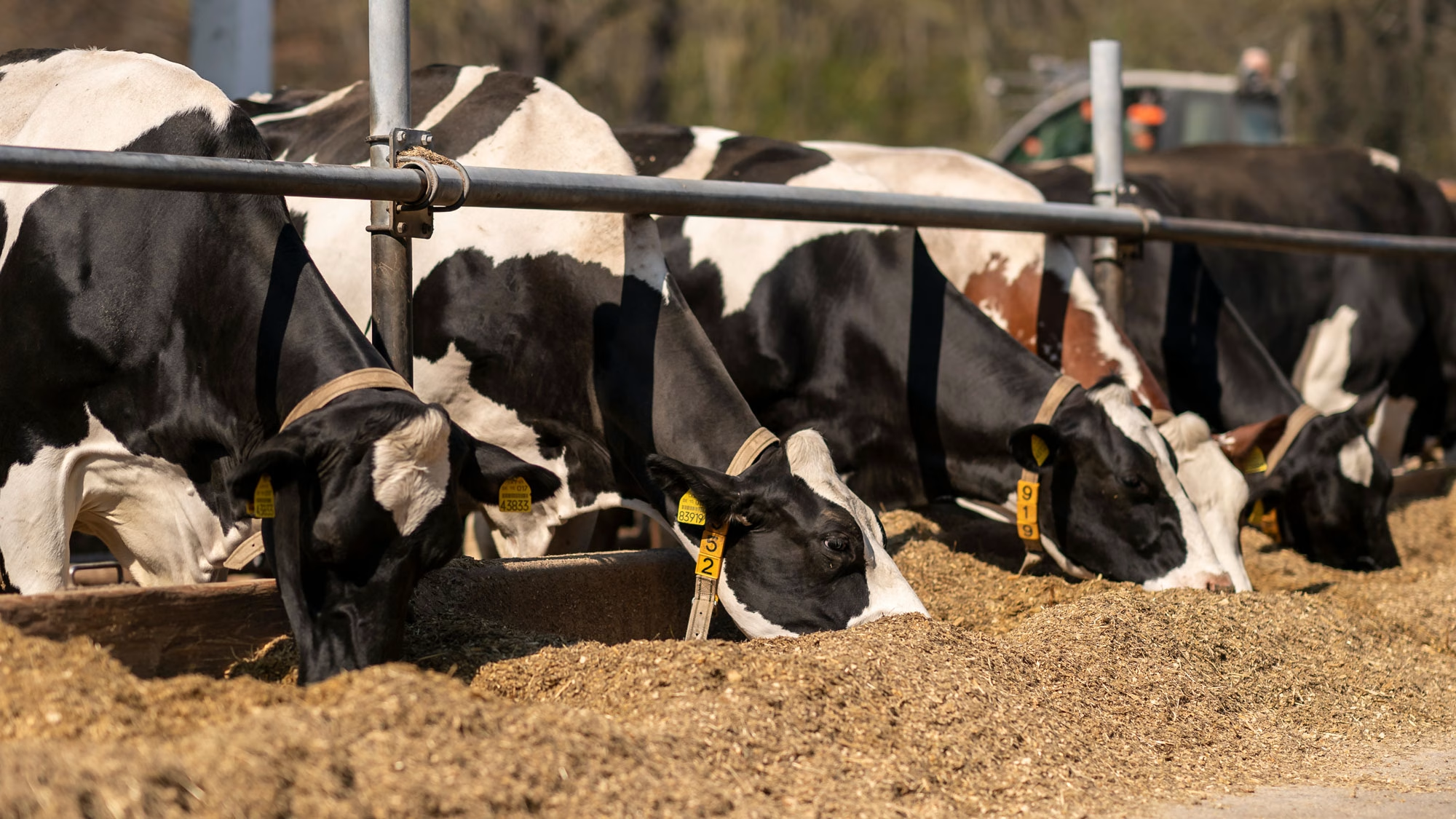Explore the transformative impact of Saccharomyces cerevisiae fermentation products on dairy cow health during gut barrier challenges. Interested in enhancing your herd’s well-being? Keep reading to uncover the advantages.

Imagine a solution that could significantly bolster the health and productivity of your dairy herd, especially during stressful periods. Saccharomyces cerevisiae fermentation products (SCFP) are emerging as a highly effective tool that not only enhances gut health but also improves the overall well-being of your lactating cows. This potent supplement can navigate the complexities of cow physiology to deliver remarkable benefits, particularly during gut barrier challenges. In this article, we will delve into the impact of SCFP on the ruminal microbiota and metabolome, presenting a comprehensive analysis of its multifaceted advantages.
Unleashing the Power of Yeast: Why Saccharomyces Cerevisiae Fermentation Products are Transforming Dairy Farming
Saccharomyces cerevisiae fermentation products (SCFP) are yeast-based supplements that enhance dairy cow health and performance through a range of metabolites and bioactive compounds. Used extensively in dairy farming, these products are known for their numerous benefits.
SCFP improve digestive efficiency by stabilizing the ruminal environment, which optimizes feed breakdown and fermentation. This leads to better nutrient absorption and overall health.
Additionally, SCFP strengthen immune function by enhancing gut integrity and reducing gut-related ailments. This is particularly valuable during stressful periods like calving or environmental changes.
Incorporating Saccharomyces cerevisiae fermentation products in dairy diets is a scientifically proven method to boost digestion, nutrient uptake, and immune resilience, ultimately enhancing the health and productivity of dairy herds.
The Comprehensive Study on Gut Microbiota and Metabolomics Amid Stress
The study on lactating Holstein cows evaluated the impacts of Saccharomyces cerevisiae fermentation products (SCFP) during a gut barrier challenge. Two groups of multiparous cows were involved—one as a control (CON) and another receiving 19 grams per day of SCFP (SCFP group). Over nine weeks, followed by a five-day feed restriction (FR) where cows were fed just 40% of their usual intake, the researchers explored the effects on ruminal microbiota and metabolomic profiles under stress.
Researchers used cutting-edge techniques to understand SCFP’s effects on the cows. They extracted DNA from ruminal fluid samples and performed PacBio full-length 16S rRNA gene sequencing for a detailed microbial profile. Real-time PCR then quantified 12 key ruminal bacterial species to zero in on specific microbial populations.
Metabolomic analysis involved examining up to 189 metabolites in the ruminal fluid via gas chromatography-mass spectrometry (GC/MS). High-quality sequences were analyzed using advanced software like TADA, MicrobiomeAnalyst, PICRUSt2, and STAMP to explore microbial diversity and metabolic functions. MetaboAnalyst 5.0 helped interpret the data, revealing complex interactions between microbiota and metabolic pathways during stress.
A Deep Dive into Microbial Diversity and Enhanced Metabolic Profiles with SCFP Supplementation
The study revealed significant insights into the influence of Saccharomyces cerevisiae fermentation products (SCFP) during gut barrier challenges in lactating Holstein cows. Notably, the SCFP group exhibited an increase in microbial diversity within the ruminal fluid, indicated by higher α-diversity Chao 1 and Shannon indices. This suggests a more varied and resilient microbial ecosystem, crucial during stress. Additionally, specific bacterial genera like CPla_4_termite_group, Candidatus Saccharimonas, Oribacterium, and Pirellula were more abundant in cows given SCFP. These bacteria are linked to beneficial processes, enhancing rumen health. Higher levels of key metabolites such as ethanolamine, glyoxylic acid, serine, and threonine were also found, highlighting positive metabolic shifts induced by SCFP.
Revealing the Metabolic Influence: SCFP’s Role in Enhancing Key Biological Processes
In our metabolite analysis, we noted significant increases in the SCFP group compared to the control. Specifically, ethanolamine, glyoxylic acid, serine, threonine, cytosine, and stearic acid levels rose. These metabolites are crucial for the health and productivity of dairy cows.
SCFP also influenced the pentose phosphate and photorespiration pathways. The pentose phosphate pathway enhances fatty acid and nucleotide synthesis, indicating improved anabolic processes in the SCFP group.
The photorespiration pathway, more common in plants, seems to help cows adapt to feed restriction stress, promoting metabolic balance and energy production under suboptimal conditions.
In addition, we found a higher abundance of Fretibacterium and Succinivibrio, which correlated positively with multiple metabolites like galactose, fructose, and alanine. This increase indicates enhanced microbial activity and metabolic function.
Overall, feeding SCFP during feed restriction shifted the ruminal microbiota composition and function, supporting pathways that boost resilience and productivity under stress. This highlights SCFP’s potential as a dietary intervention to enhance dairy cow health and performance.
Boosting Resilience and Productivity: Practical Implications for Dairy Farmers
As dairy farmers, maintaining the health and productivity of your cows, especially during stress periods like feed restriction, is crucial. Our study shows that adding Saccharomyces cerevisiae fermentation products (SCFP) to your cows’ diets can offer significant benefits.
Incorporating SCFP helps your cows maintain a healthier gut barrier, improving digestive health during stressful times when feed intake is restricted. This enhancement in ruminal microbiota diversity and metabolic profiles supports better nutrient absorption and overall gut function.
For your herd, this means less disruption to milk production and cow health during stress periods. Beneficial metabolites like ethanolamine, serine, and stearic acid support gut health and essential physiological functions.
Introducing SCFP into your cows’ diet can boost resilience to stress by enhancing metabolic pathways like the pentose phosphate pathway and photorespiration, which improve energy production and reduce oxidative stress.
Start gradually with the recommended SCFP dosage, monitor improvements in health and production, and consult a nutritionist if needed. By strategically using SCFP, you can help your cows thrive even under challenging conditions.
The Bottom Line
Supplementing Saccharomyces cerevisiae fermentation products (SCFP) during gut barrier challenges offers significant benefits to dairy cows. SCFP enhances ruminal microbiota diversity, supports key metabolic pathways, and boosts cows’ resilience and productivity under stress.
This study shows that SCFP supplementation increases important metabolic processes like the pentose phosphate pathway and photorespiration. It also fosters a more diverse microbial environment, leading to better gut health and overall physiological robustness.
For dairy farmers, incorporating SCFP into the feed regimen can dramatically improve herd health and productivity. SCFP helps mitigate stress effects, promoting a healthy gut microbiome, which translates to better milk production and farm performance.
Consider the solid evidence for SCFP supplementation. It’s a scientifically proven method to enhance cow health and boost farm sustainability and profitability. Investing in SCFP might be the step that sets your dairy operation apart.
The science behind SCFP is complex, but its benefits are clear. Healthier cows lead to a healthier farm. Embracing SCFP can have lasting positive impacts on herd well-being and productivity. As we strive to improve dairy farming practices, innovative feed solutions like SCFP are essential.
Key Takeaways:
- Saccharomyces cerevisiae fermentation products (SCFP) improve the health of dairy cows by modulating the gut microbiota, especially during stress periods such as feed restriction.
- Feeding SCFP to lactating Holstein cows resulted in greater microbial diversity and distinct metabolite profiles in the rumen.
- Enhanced concentrations of beneficial metabolites like ethanolamine, serine, and stearic acid were observed in cows supplemented with SCFP.
- Key metabolic pathways, including the pentose phosphate pathway and photorespiration pathway, were upregulated by SCFP, suggesting improved metabolic efficiency.
- SCFP supplementation led to the predominance of beneficial bacteria like Fretibacterium and Succinivibrio, which are associated with various positive biological processes.
- The study highlights significant shifts from the tricarboxylic acid cycle to the glyoxylate cycle in cows fed SCFP, enhancing nitrogenous base production.
- Dairy farmers can leverage SCFP to boost cow resilience and productivity by supporting better gut health and metabolic functions.
Summary:
Saccharomyces cerevisiae fermentation products (SCFP) are a yeast-based supplement that can significantly improve dairy herd health and productivity during stressful periods. SCFP stabilizes the ruminal environment, optimizes feed breakdown and fermentation, and enhances digestive efficiency, nutrient absorption, and overall health. It strengthens immune function by enhancing gut integrity and reducing gut-related ailments, especially during stressful periods like calving or environmental changes. A study on lactating Holstein cows showed that SCFP increased microbial diversity within the ruminal fluid, promoting a more diverse and resilient microbial ecosystem. Specific bacterial genera like CPla_4_termite_group, Candidatus Saccharimonas, Oribacterium, and Pirellula were more abundant in cows given SCFP, which are linked to beneficial processes. SCFP also influenced pentose phosphate and photorespiration pathways, promoting metabolic balance and energy production under suboptimal conditions. In conclusion, SCFP during feed restriction shifts the ruminal microbiota composition and function, supporting pathways that boost resilience and productivity under stress.











